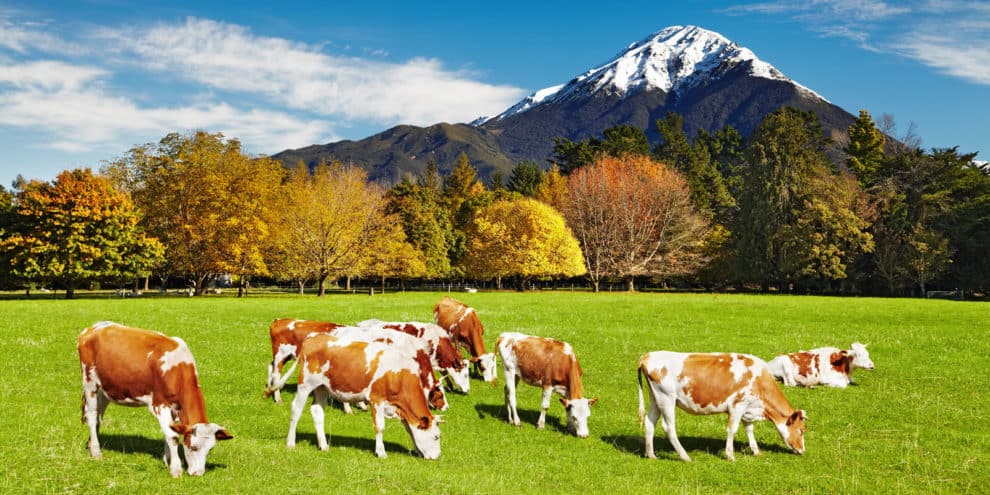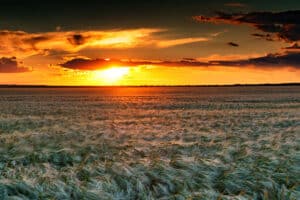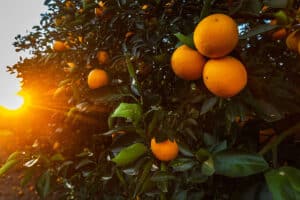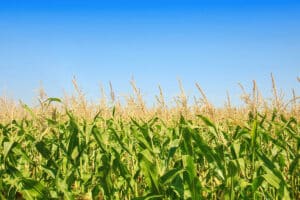Ranch and farm are two common words used in North America. Many people often confuse the two or think they are the same thing when, in actuality, they aren’t.
In a nutshell, a farm is typically a lot of land that is used primarily for agriculture. There are many different types of farms that grow or produce a variety of food, fuels or other raw materials. The most popular, perhaps, are dairy farms and crop producing farms. Ranches, on the other hand, are usually a specific type of farm. They are large farms where most of the products produced are animals with the most common animal being cattle. Besides these broad differences, there are a lot of distinct differences as well.
- Cattle ranches produce the beef/meat that are served in a restaurant or bought off of the shelf at a grocery store.
- Dairy farms produce milk that is bought from the store and other products made from dairy, like cheese.
- Beef cattle on ranches tend to be more muscular while dairy farm cows are lean.
- Dairy farm cows must follow a strict schedule and diet in order to produce more milk. Cattle on the ranch have more flexibility. Ranchers spend most of their time checking the herd, fixing equipment or hauling water.
- Dairy farmers must shell out a hefty price for quality hay and other feed in order to give their cattle the energy and nutrients they need. Crop farmers usually need to invest in agricultural equipment. In addition, they may set aside a budget for equipment maintenance. Ranchers rely mostly on the land.
- Dairy farmers harvest milk consistently throughout the year to keep an on-going supply while cattle ranchers sell their cattle once a year.
The difference between a farm and a ranch is really based on the perception of the individual. The bottom line is that both farmers and ranchers work long hours all year round in order to put food on our tables every day, and we are thankful for each and every one of them.
This content may not be used or reproduced in any manner whatsoever, in part or in whole, without written permission of LANDTHINK. Use of this content without permission is a violation of federal copyright law. The articles, posts, comments, opinions and information provided by LANDTHINK are for informational and research purposes only and DOES NOT substitute or coincide with the advice of an attorney, accountant, real estate broker or any other licensed real estate professional. LANDTHINK strongly advises visitors and readers to seek their own professional guidance and advice related to buying, investing in or selling real estate.










Where was the subject picture taken? It’s beautiful!
I’m more for beef cattle on ranches since i would like to do so myself, but it would of been more beneficial to compare them to beef cattle on a farm senario than using dairy cattle.
Beef cattle on a ranch and beef cattle on the farm are or should be managed the same. This article has me entertained because the of their perception. It is skewed and bias. I have seen plenty of ranchers still have to “shell out a hefty price” to supplement nutrition. I do believe that you see a wider variety of animals on a farm compared to a ranch but overall both are pieces of land that are used primarily for agricultural production. I’ve witnessed planting of field crops such as wheat on a ranch to supplement feed in late winter just as it could be done on a farm. From this, I’d also go as far as both can be used for crop and livestock production.
All the article was stating was that ‘agriculture’ is considered the raising of vegetables or other food crops, rather than the objective being raising some kind of livestock for meat. Both, unfortunately, due to rising costs of everything, have to ‘shell out’ a lot to keep things going. If a rancher does raise wheat, alfalfa or other grains or grasses to grow those livestock, that’s not the same as a traditional farmer being involved in agriculture —of which his main objective is the growing of crops to feed the human population. If a rancher raises a crop that is simply to help feed the dominant product — the livestock he’s growing, that’s not what is meant by traditional agricultural farming. I’m not sure why the information given to compare and contrast the ranches and farms, is “skewed” or “biased”. I always thought to ‘skew’ something was to distort it intentionally. This is an article to explain the differences in terms historically associated with husbandry. I haven’t been able to attach an intent to ‘skew’, just explain. Insofar as ‘biased’, it means being unfairly prejudiced! How do you get that from this article? If you mean that at times farms and ranches are blended, raising both livestock and crops, making them neither a ranch nor farm—well, of course there are always blends of lots of things, but that’s not a bias or a skew on attempting to state what is meant traditionally by each.
My wife and I are buying 9 acres of land and trying to decide if we are going to call it “The Ranch” or “The Farm” Probably going to be farm because its not mostly cattle.
It’s false to say ranchers “haul water” That depends on the land. In SE Texas that’s not part of the job, in West Texas, it is. I pick this nit for good reason. The Vegans are making absurd claims about ranching, that it takes X amount of land, or water to raise a cow. In fact, land is sold and valued based on this VARIABLE. A cow raised in SE Texas Coastal plain will use environmentally speaking zero water, where a cow raised in West Texas uses much more, (or the deserts of CA as a Vegan Sociology professor did, writing a book that informs the Vegan perspective) Irrigated vegetables use more water environmentally speaking than a cow raised in the Coastal plains.
Here’s a difference you failed to make, A ranch is a preserved habitat/eco-system where a farm is a chemically and mechanically denuded mono-culture. You wouldn’t want to pitch a tent on a “farm” where a ranch would be ideal. I’m an organic gardener by trade and training. I care about the environment, and I care about the truth. Feedlots are disgusting cesspools and seemingly could be phased back our out with modern distribution tech. We could easily mitigate some of the worst ills of animal production by focusing on the most acute issues. But, if we don’t do due diligence, we’ll waste money, time and resources. We should probably label vegetables as to whether they were raised on irrigated farms or off rain water. We have to be smarter, more precise, and more specific in our discussions.
In most systems the first 90% of efficiencies, waste and pollution reduction can be had for a fraction of the cost of the last 10%. We need to grab that low hanging fruit first and go from there. When we fail to define our terms, when we make sweeping claims about very diverse systems, we’re wasting our time, and if we base policy on such sloppy understanding, we waste even more.
Your words are spot on not only in the topic of farming, but really every issue and argument there is these days. We need people voicing common sense way more because social media magnifies idiocy too much.
You are mistaken, Scott, in your second paragraph. My family (mixed) farm is close to paradise. We camped on it, too. We have pasture land and wooded areas. We have fields of crops and we farmed using smaller tractors, etc. Most of the family farms I know of are like this in my area. Our animals are cared for and treated with respect. We used natural manures, too, often (cattle and green crops). Perhaps you should have differentiated between factory farms and family farms,– and well, of course, not every farmer or rancher has the same outlook, so you will have different attitudes and approaches. I have an orchard, which I use only organic sprays on and untreated mulch.
Scott, I agree about the misinformation spewed by so-called environmentalist vegans. I have spoken up at organic/natural foods store meetings, when wrong information is given up by these “city slickers” about farmers. (We don’t have ranches in my area.) I, also, worked for Greenpeace years ago, urged to do so by my farmer father, as we care about the environment. I love your point about vegetables needing a lot of water and growing practices being dependent on the region. I did not realize the information on raising beef cattle was so skewed by a researcher. I only knew what was true for our farm and area. Thank-you for giving us this information!
Tree nurseries use a lot of water, too. I have neighbors involved in this and the amount of plastic (which they burn sometimes at night– to get away with it!), water, and top soil being taken away is horrendous. No one needs to have a big tree grown for them that badly. This is what is allowed on good farming land, too! We need food and to preserve the land with good care, not big ornamental trees. My father pointed out that the nurseries were using a lot of water and their sprays are toxic. It is funny that all the environmentalists have ignored these practices and focused on animals. I figure that if we let cattle go free now after 1,000 plus years of domestication, they would be near extinction in the near future. Where could they go? Many would cause fatal traffic accidents. I have even emailed Ocean Robbins (Nov. 12, 2013) about this dilemma regarding our moral responsibility to care for cattle and other domestic animals. If one looks at how in a short time farm breeds that are no longer popular, are suddenly on the verge of extinction; one will find the truth in what will happen to our domesticated animals. (See The Livestock Conservancy for more information. I use it and the U.K. one for ideas of what I should raise.)
Thank you to all those who raise food for us to eat in a responsible way. We would not survive long or as healthily without you!
Conventional ranch, un-ravished by over-modernisation, always appears the prettiest.
Hundreds of ranches are for sale nowadays in the USA. A clear sign that God, the best investor of all, never intended that it would be orchard only. Genesis 1 (Holy Bible) is very clear by mentioning fruits and seeds as our menu that it should be RANCHARD = RANCH + ORCHARD. Trees and animals.
Remove the trees and you have now America’s sorry condition: ranches for sale and very expensive to maintain instead of achieving diminishing cost/expenses year after year.
Remove the animals and you too will have America’s orchard now which are dying due to being overpoisoned by the chemical fertilizers and pesticides which the cows and other livestock should have more efficiently provided!
Therefore, where God made whole and one (e.g., trees + animals + man), let no man separate!
In my point of view Farm is much better, because you may have different activities and different products to sell. Farming is more interesting and even more beautiful. For farming you don’t need lots of acres, with smaller than ranch territory you are able to grow different plants, fruits, vegetables and even chicken, cattle and pigs. Farming is about more opportunities for owners, if you are smart you may make more money by services to the public for weddings or photoshoots and much more.